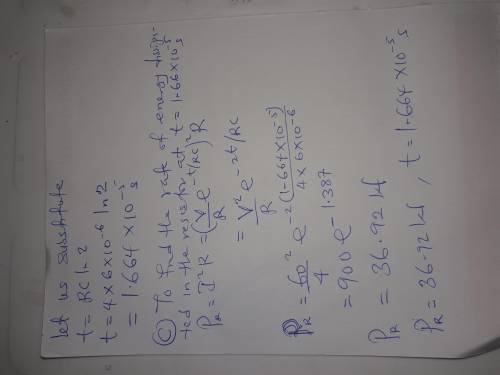
Physics, 10.03.2020 09:10 tayjohn9774
A 6.00 μFμF capacitor that is initially uncharged is connected in series with a 4.00 ΩΩ resistor and an emf source with EE EMF = 60.0 V and negligible internal resistance. The circuit is completed at t = 0. (a) Just after the circuit is completed, what is the rate at which electrical energy is being dissipated in the resistor? (b) At what value of t is the rate at which electrical energy is being dissipated in the resistor equal to the rate at which electrical energy is being stored in the capacitor? (c) At the time calculated in part (b), what is the rate at which electrical energy is being dissipated in the resistor?

Answers: 2


Other questions on the subject: Physics

Physics, 22.06.2019 14:40, hastephens03
According to valence bond theory, which orbitals overlap in the formation of the bond in hf according to valence bond theory, which orbitals overlap in the formation of the bond in hf 2s on h and 2p on f 1s on h and 2s on f 1s on h and 1p on f 1s on h and 2p on f 1s on h and 3p on f
Answers: 3

Physics, 22.06.2019 21:30, LucidDreamer16
What describes the formation of horizon b? a. forms at the surface b. features parent material c. undergoes the most change d. forms due to decomposed material i think the answer is c. undergoes the most change
Answers: 1

Physics, 23.06.2019 02:00, jocelyn7575
Provides most of the energy used in the world today. question 4 options: wind fossil fuel moving water sunlight
Answers: 1

Physics, 23.06.2019 08:30, Lukejohn
Which is gerrymandering a problem for the house of representatives but not the senate? a.) members of the house are greatly influenced by their political parties. b.) senators serve longer terms than members of the house. c.) members of the house are more influenced by changes in public opinion. d.) senators are elected in statewide elections rather than in specific districts.
Answers: 1
You know the right answer?
A 6.00 μFμF capacitor that is initially uncharged is connected in series with a 4.00 ΩΩ resistor and...
Questions in other subjects:

Biology, 23.07.2019 19:00

Mathematics, 23.07.2019 19:00

Health, 23.07.2019 19:00






Physics, 23.07.2019 19:00

Geography, 23.07.2019 19:00





